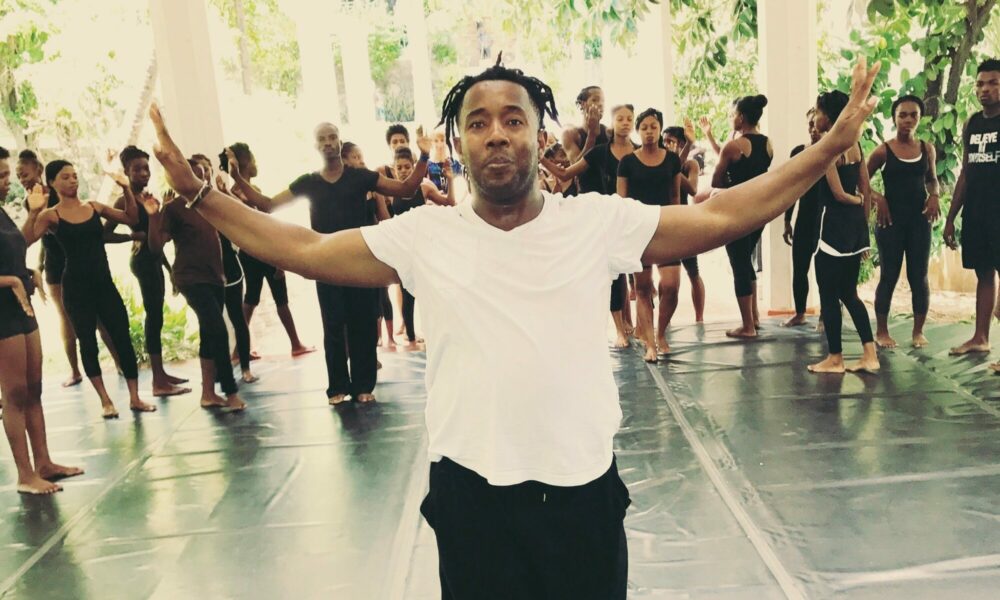

Today we’d like to introduce you to Jean Appolon.
Hi Jean, can you start by introducing yourself? We’d love to learn more about how you got to where you are today?
I am the Co-Founder and Artistic Director of Jean Appolon Expressions dance company. The traditional art form that I practice is Haitian folkloric dance. Growing up in Haiti, I immersed myself in all dance education opportunities that were available to me as a young boy in Port-au-Prince, even though my parents forbade me to dance. I pursued my advanced training after immigrating to the US at Alvin Ailey Dance Theater and the Joffrey Ballet School.
My choreography preserves Haitian folkloric dance and combines this tradition with Modern technique, especially Horton. I became influenced by Horton when I studied at Ailey. I feel fortunate to situate myself inside this rich artistic lineage as I pursue my mission to restore, preserve and advance Haitian folkloric dance by constantly pushing the art form forward while remaining accessible and educational.
My audience is diverse and includes my students from both the U.S. and Haiti, of all ages, abilities, ethnicities, economic situations and sexual orientations. I feel I am doing something significant by keeping Haitian folkloric dance alive for both Haitians and non-Haitians who take my classes and attend JAE’s performances in the U. S. and Haiti. When audiences see my choreography, I want them to feel moved and immersed in what they are experiencing because the dancing is so powerful, dynamic and expressive. I want my audiences to learn something about who I am and about Haitian dance, culture, people and contemporary issues. I want them to see Haitians’ strength in the face of adversity but also their beauty, pride and majesty.
Can you talk to us a bit about the challenges and lessons you’ve learned along the way. Looking back would you say it’s been easy or smooth in retrospect?
My father was killed in Port Au Prince during the 1991 Aristide coup and I have carried this trauma throughout my entire life. After immigrating from Haiti to Boston in 1993, I hoped to create work that would take on some of this trauma and that would confront the epidemic of mental illness and the historical and social traumas so many Haitians face. Boston has a vastly diverse population and continues to attract immigrants from around the world. I see so much opportunity for the city to uplift and share these perspectives in a huge way and am eager to be a part of this celebration of Boston’s diversity.
Can you tell our readers more about what you do and what you think sets you apart from others?
My audience is diverse and numerous and includes my students from both the U.S. and Haiti, of all ages, abilities, ethnicities, identities, economic situations and sexual orientations. The same diversity classifies the audiences who attend performances of my Boston-based dance company. I feel I am doing something significant by keeping Haitian folkloric dance alive for both Haitians and non-Haitians who take my classes and attend my Company’s performances in Boston and in Haiti. One of my most important audiences are Haitian youth who I work with every July during a free Summer Dance Institute that I conduct in Port-au-Prince. Haitian folkloric dance is one of the world’s cultural treasures but tragically, it has become nearly extinct, especially within Haiti. It is my calling to preserve the tradition of Haitian folkloric dance and pass it on to the next generation of Haitians so that these young people can inherit what is rightfully theirs and makes them unique as Haitians.
When audiences see my choreography, I want them to feel moved and immersed in what they are experiencing and on the edge of their seats because the dancing is so powerful, dynamic and expressive. I want my audiences to learn something about who I am and about Haitian dance, Haitian culture, Haitian people and Haitian contemporary issues. I want my audiences to see Haitians’ and immigrants’ strength in the face of adversity but also their beauty, pride and majesty. Because of everything my country has gone through, Haiti has a negative image. I want to be part of a movement that transforms Haiti’s image by highlighting its positive aspects, including Haitian dance, music and folkloric culture. Traditional dance from different countries is often presented as static and as something of the past. I seek to avoid this in my choreography and present Haitian dance in a more engaging format so the art form can evolve and be relevant to my audiences.
My choreography preserves Haitian folkloric dance but also combines this tradition with Modern dance technique, especially Horton technique, which was often used by the late choreographer Alvin Ailey. Developed by Lester Horton, Horton technique emphasizes a whole body, anatomical approach to dance to enable unrestricted, dramatic freedom of expression. I became influenced by Horton technique when I studied at Alvin Ailey American Dance Theater. I also feel connected to Horton technique because when I was a boy in Haiti, Ailey dancer Lavinia Williams came to Port-au-Prince for extended periods to teach and immerse herself in the Haitian folkloric dance tradition. There is a very interesting back and forth “conversation” that has taken place over the years and continues today between Horton technique, black
dance in the U.S., and Haitian folkloric dance from Haiti. This conversation also includes black dance icon Katherine Dunham. I feel fortunate to situate myself inside of this rich artistic lineage as I pursue my mission to restore, preserve and advance Haitian folkloric dance by constantly pushing the art form forward while remaining vital, accessible, inspirational and educational.
Alright, so to wrap up, is there anything else you’d like to share with us?
JAE’s full production, Traka, will premiere at the Institute of Contemporary Art in Boston, MA on May 13 and 14, 2022 and will be presented by Global Arts Live. You can see the short documentary about The Making of Traka here: https://www.youtube.com/watch?v=O1IHX4jn1_c
JAE is actively working to bring Traka on tour to Miami in late 2022/early 2023 and is looking for partnering organizations to host its free community workshops. Reach out via our email below if you are interested in collaborating!
Pricing:
- Dance classes $5-20
Contact Info:
- Email: jaexpressions@gmail.com
- Website: https://jeanappolonexpressions.org/
- Instagram: https://www.instagram.com/jaebostonhaiti
- Facebook: https://www.facebook.com/JeanAppolonExpressions/
- Twitter: https://twitter.com/jaebostonhaiti
- Youtube: https://www.youtube.com/user/JAExpressions
- Other: https://www.youtube.com/watch?v=O1IHX4jn1_c








Image Credits
Lou Jones Olivia Moon Nadia Todres Byron Wallace












